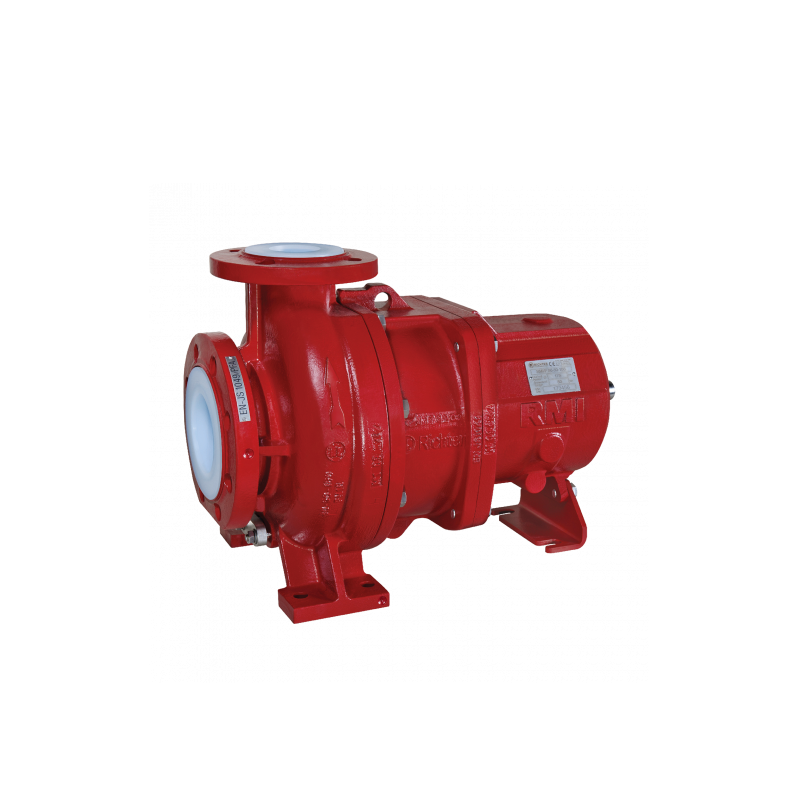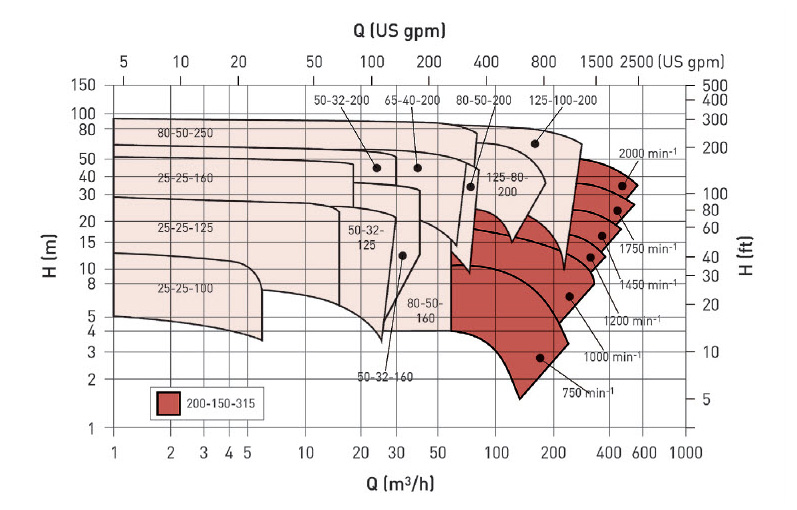Wacker Chemie AG, Burghausen/Germany tries out 600 m3/h (2650 USgpm) fluoroplastic lined magnetic drive pump
A mixture of acetic acid, formic acid and acetaldehyde, operating temperature 80°C (175 °F) – the environment in which the pumps used at the German Wacker Chemie in Burghausen, Production Unit 'Acetyls', do their work is everything but simple. With the PFA/PTFE-lined magnetic drive pump MNK 200–150–315 (8–6–12”) the operator is now entering a new performance dimension – and is expecting no less than cost savings of up to 70%.
The use of emission-free pumps is mandatory for many applications in the chemical industry (key word: such as Clean Air Act German “TA-Luft”). Conventional mechanical seal pumps will then have to be replaced. This was also the case in a plant of the Production Unit 'Acetyls' at the Burghausen site of Wacker Chemie AG. But which leak-free alternative should be selected? The 41-strong team under Richard Losbichler, head of the service centre for machines / pump centre is best qualified to answer such questions. “In our pump centre five employees advise our works colleagues on the procurement of all kinds of continuous-flow machines – i.e. pumps, compressors and ventilators. In the service centre for machines we maintain these units.“ The workers can therefore best judge continuous-flow machines of any kind (some 16,000 of these machines are installed in Burghausen), they know the specific strengths and weaknesses of the products offered on the market.
In this case the in-house contractawarder was the engineering department of the 'Acetyls Supply Chain' division. “We look after the basic material plants of the 'Polymers' division in Burghausen, maintain the technical equipment and perform optimisation tasks so that the plants run for as long and as well as possible. And we ensure that the environmental protection requirements are observed,“ says plant maintenance engineer, Gerhard Bauer, describing the work of his 15 colleagues and himself.
The Production Unit 'Acetyls' is an important supplier of raw materials within the Wacker Group with its complex network systems. Starting with ethylene, the division produces acetaldehyde according to the Wacker process and, in another oxidation stage, formic acid which is then further processed into vinyl acetate and ketene. The pumps in question convey a very corrosive fluid consisting of acetic acid, formic acid and acetaldehyde in a temperature range of between 50 and 80°C (120-175 °F).
Emissions-free is not enough on its own
In principle, double-acting mechanical seal systems (back-to-back arrangement), canned motor pumps and metallic or plastic-lined magnetic drive pumps are available as emission-free technologies. In this particular application the selection options are, however, limited, as Richard Losbichler explains: “Metallic pumps have problems with crevice corrosion when conveying acetic acid at elevated temperatures. In the case of double mechanical seals major problems arise on the shaft sleeve, with metallic magnetic drive pumps crevice corrosion can be expected on the separating can itself and in other areas of the pump.“ A magnetic drive pump lined with fluoroplastic was seen as an obvious solution – but such a pump was not previously available on the market with the required flow rate above 300 m³/h (1300 USgpm) at 1450 rpm.
Therefore, metallic magnetic drive pumps were installed in spite of the known risks of corrosion – with relatively high running costs as well as maintenance and repair outlays at intervals of 6 and 12 months. And so it suited Richard Losbichler and his team down to the ground that Richter developed a suitable high-performance magnetic drive pump lined with fluoroplastic last year. “We have gained good experience with PFA and PTFE-lined MNK pumps with similarly aggressive media. We are therefore assuming that such a pump will have a considerably longer service life than the pumps previously used. We are therefore counting on a substantial reduction in the life-cycle costs.”

Since its installation in early December, the pump has been operating without any problems as expected. It runs very quietly, that's always a good sign"
Series for highly corrosive media
Richter Chemie-Technik is a pioneer in this field and as far back as in 1983 presented the first magnetic drive centrifugal pump lined with fluoroplastic, the MCK series. This developed into the MNK series: All components which come into contact with the medium either have a thick PFA fluoroplastic lining (housing, plain bearing pedestal, impeller, shaft and inner magnet assembly), are made of solid PTFE fluoroplastic (separating can insert) or made of sintered silicon carbide SSiC (plain bearings). The double can system between the inner and outer magnet assemblies ensures freedom from leaks: The PTFE fluoroplastic can insert is highly resistant to corrosion, the outer can made of carbon-fibre composite material bears the pressure load.
As the concept was convincing owing to its high reliability and dry-running capability and the low level of maintenance compared with mechanical seal pumps, and the life-cycle costs are comparatively low, the MNK was rapidly accepted on the market after its launch. This also applies to Wacker in Burghausen: 750 Richter pumps are now in operation there. In addition to the aspects of robustness and reliability, the exchangeability of components among the different sizes is also an important advantage of this series in practice.
Today, the MNK is a highly recognized alternative to magnetic drive pumps made of special metals such as Hastelloy, Alloy20, tantalum, nickel etc. The reasons are self-evident: It is cheaper to procure, generates no eddy-current losses and the delivery time for the pump and spare parts can be estimated at only 4 to 8 weeks instead of 10 to over 20 weeks.
In December 2007, the PFA / PTFE-lined MNK 200–150–315 was then installed in Burghausen. It is designed as a single-stage, sealless chemical centrifugal pump of heavy-duty, horizontal design in accordance with EN 22858/ISO 2858/ISO 5199 and therefore qualified to operate in a series of processes, for example chlorine electrolysis and sulphuric acid production and treatment. And, of course, for conveying a hot mixture of acetic acid, formic acid and acetaldehyde.
Magnetic drive pump up to 600 m3/h (2650 USgpm)
10 more pumps of this size will be put into operation over the next few months at various international chemical companies – with flow rates of up to 400 m³/h (1750 USgpm), also for conveying HCl and H2SO4 at temperatures over 150 °C (300 °F).
Conclusion: The MNK 200–150–315 greatly extends the performance range in the market segment 'pumps for conveying highly corrosive media'. The pump at Wacker Chemie is operating in an area which is regarded as particularly difficult. “Since its installation in early December 2007, the pump has been operating without any problems as expected. It runs very quietly, that's always a good sign,“ says Mr. Bauer, the plant maintenance engineer. “If the pump proves successful here, it will certainly also master the other tasks in this circuit and we can count on considerable cost savings,“ according to Richard Losbichler and Gerhard Bauer agreeing in full. The expectations stretch to life-cycle cost savings of 70%.
PHYSIcAL Challenges
Interview with Richard Losbichler, Wacker Chemie
There is a market for plastic-lined magnetic drive pumps with a high flow capacity”
Procurement costs of magnetic drive centrifugal pumps.
Mr. Losbichler, why is a PFA/PTFE-lined magnetic drive pump the best solution for conveying hot acetic acid?
Losbichler: At temperatures around 80°C (175 °F) acetic acid can result in crevice corrosion in the existing crevices in a metallic pump. Under certain circumstances metallic pumps must then be overhauled at fairly short intervals. Moreover, a nonmetallic separating can made of CFRP (carbon-fibre reinforced plastic) is substantially more favourable than a metallic can which inevitably produces eddy-current losses.

Why has there been no plastic-lined magnetic drive pump of this rating available until now?
Losbichler: There are certain physical challenges here. For example, very high centrifugal forces occur with such a large impeller. Other pump manufacturers therefore dismissed us when we started our inquiry. Richter had such a pump under development and was able to make it available on completion of in-house, long-time tests. Our requirements were taken into account.
How do you rate the chances of this new development?
Losbichler: If the pump satisfies the requirements laid down in the product specifications – and everything speaks in favour of that at the moment – another 8 pumps are needed in the relevant plant alone. And other chemical companies have, of course, comparable tasks. After I reported this new development to the project group “Pumps in the chemical industry” (umbrella association of the German chemical industry association VCI), several companies clearly showed interest in MNK pumps of this size. This shows that there is a market for plasticlined magnetic drive pumps with a high flow capacity
Richard Losbichler is the head of the service centre for machines / pump centre at Wacker Chemie AG in Burghausen, Germany
